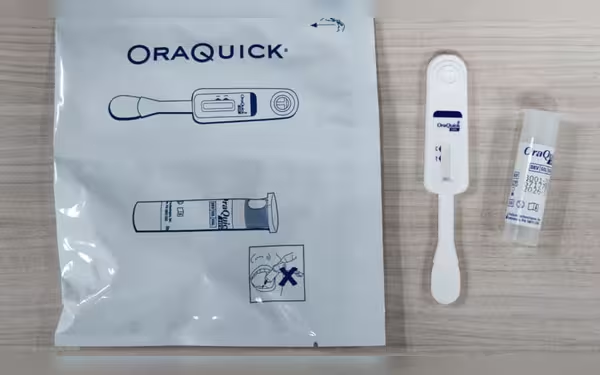Sunday, December 22, 2024 09:12 AM
Singapore Introduces HIV Self-Test Kits to Enhance Public Health
- HIV self-test kits available by January 2025.
- Only 15% of new cases detected through self-testing.
- Early detection crucial for better health outcomes.
 Image Credits: channelnewsasia
Image Credits: channelnewsasiaSingapore to launch HIV self-test kits by January 2025 to improve testing access and public health awareness.
SINGAPORE: In a significant move to enhance public health, Singapore is set to introduce HIV self-testing kits at selected retail pharmacies by the end of January 2025. This initiative, announced by the Ministry of Health (MOH), aims to improve access to HIV testing and promote regular testing among the community. The availability of these self-test kits is a part of a broader strategy to combat the spread of HIV and ensure that individuals are aware of their health status.
The MOH emphasizes that "HIV self-testing is a quick and convenient way to learn one’s HIV status." These kits allow individuals to collect oral specimens using a simple swab in the privacy of their own homes. This approach is particularly important as many newly diagnosed HIV patients are found to be in late-stage infection, with alarming statistics showing that 52 percent of cases detected in 2023 were at this advanced stage.
Despite the availability of testing, the MOH reports that only a small percentage of individuals are taking the initiative to test themselves. In 2023, only 15 percent of new cases were detected through self-initiated testing. The ministry strongly recommends that every adult should get tested for HIV at least once in their lifetime, regardless of perceived risk factors. For those engaging in high-risk sexual behaviors, regular testing every three to six months is advised.
In 2023, Singapore reported 209 new cases of HIV among its citizens and permanent residents, a slight increase from the previous year. This rise in cases highlights the urgent need for increased awareness and testing. The introduction of self-test kits is timely, coinciding with World AIDS Day on December 1, which serves as a reminder of the ongoing battle against HIV/AIDS.
The pilot program for HIV self-testing, conducted at the Department of Sexually Transmitted Infections Control (DSC) Clinic and the non-governmental organization Action for AIDS (AfA) since August 2022, has shown promising results. The MOH noted that the pilot demonstrated the acceptability, safety, and effective use of self-testing, encouraging individuals who had never tested for HIV to take action.
However, it is crucial to understand that a positive result from a self-test kit does not confirm an HIV infection. The MOH advises that individuals who test positive should seek further confirmatory testing from a healthcare provider. Additionally, if a person receives a negative result but has had recent unprotected sexual exposure, it may take up to three months for antibodies to develop and be detectable by the testing kits.
The introduction of HIV self-testing kits in Singapore represents a proactive step towards improving public health and increasing awareness about HIV. By making testing more accessible, the MOH hopes to encourage individuals to take charge of their health and seek necessary support. It is essential for everyone to understand their HIV status, as early detection can lead to better health outcomes and reduce the risk of transmission. Remember, no matter the test result, support and resources are available for those who need them.













